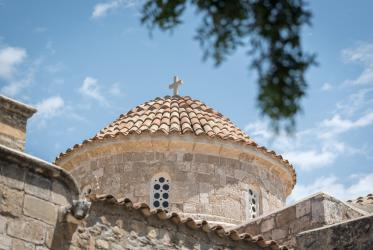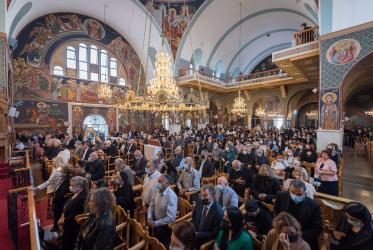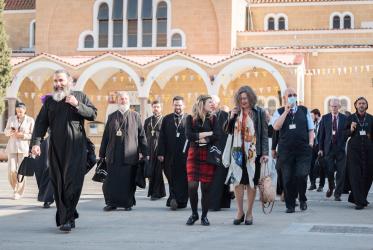By Jean Fischer
Sub-Committee I asked for a Protestant response to the document coming from the inter-Orthodox preparatory meeting. In this response, I choose to offer comments which could help in discussing the three questions assigned to Sub-Committee I:
- Should membership be based on individual member churches or another model?
- How should the Orthodox churches be fairly represented in governing bodies, and by what criteria?
- By what means and method should we make decisions in our governing bodies?
My comments should be considered "a personal response". I am a Protestant, member of a Reformed church, but the following points are more reflecting my long involvement and service in the ecumenical movement than my belonging to the Reformed tradition.
During the Morges meeting, I felt that the two parts of the Special Commission -- Orthodox representatives and non-Orthodox ones -- began the discussion in an asymmetric way. It was clearly affirmed that the non-Orthodox part is far from being a Protestant group, and that due recognition must be given to Anglicans, Old Catholics and other distinct traditions represented within the Protestant churches. The "Evangelical tradition" is represented among these traditions, which at times has taken positions closer to Orthodox positions than to "Protestant" ones.
The non-Orthodox part did not have a preparatory meeting, which could have been valuable, be it only for the members to get to know each other. Pity that we did not start on an equal basis. I hesitate therefore to speak for a group. Furthermore, I did not have a chance to interview the leadership of churches in Switzerland or France to explore whether the questions we are discussing in this commission have ever been on their agenda and whether they have any specific convictions about changes to be advocated for the organization of the WCC. The closest I got to this matter is the reports of two meetings organized in Switzerland (1997 and 1998) on "Basic problems of communication between Western Protestantism and Eastern Orthodoxy" and "Cultural factors in the encounter between Western Protestantism and Eastern Orthodoxy". They are, I believe, relevant to the work of the special commission.1 It is to be hoped that the matters to be handled by our commission will also be discussed among Orthodox and non-Orthodox churches at home in different countries so as to enrich our debates. One such meeting is likely to take place in France in autumn 2000.2
I shall concentrate my comments on the first part of H.E. Metropolitan Chrysostomos of Ephesus' paper which is referred to Sub-Committee I.
Towards a New Structure of the WCC:
This section intends to explore fundamental amendments to the present constitution of the WCC and modifications of the present rules and by-laws. I agree that this approach is likely to lead more rapidly to changes regarding the basic problems listed in para. 3 of the introduction:
- allow Orthodox churches to feel and act comfortably within the WCC;
- prevent them from having problems of consciousness and other anxieties;
- avoid all problems and circumstances leading to an alienation from the ecumenical idea and movement.
However, amending the present constitution does not mean that a thorough constitutional revision is not necessary as well. Visser't Hooft's book "The Genesis and Formation of the WCC" underlines that from the very beginning issues of "representation" have been problematic. Whether the representation was to be through confessional families, regional or national councils, etc. was already part of the debate and "insufficiently dealt with". One major concern at the time was to include the churches as members. "For the WCC, itself a body without canonical authority, it was essential to be in direct touch with the churches which were competent to speak officially in councils' meetings on behalf of their members and to translate World Council proposals into concrete action" (p. 62).
Now, after 50 years with an enlarged membership, representing churches in all continents the question can be asked: is this still necessary or would any other form of representation be possible without weakening the commitment of the churches? Today the instruments of governance within the WCC are practically the ones established in 1948 when the membership was half of what it is now, and concentrated on two continents.
Today, regional ecumenical organizations (REOs) exist. Would it not be possible to organize a division of labour between the WCC and REOs to make possible the handling of contextual/regional agendas while reserving more fundamental tasks to be handled at world level? At the Harare assembly such a trend was mentioned but not debated.
Today the great variety of historical, cultural and religious contexts represented in the world family of the WCC raise the question of whether one and the same agenda will satisfy the needs and priorities felt by member churches here and there. It may well be that not all churches can and should take part in all activities and programmes. There could be a way for the WCC to assist some of its member churches which would want to undertake specific activities in their own name with the WCC's help. In the KEK constitution this is specifically mentioned in the following formulation: "The Conference can act on a mandate given by member churches, and only in their name, if so asked by one or more member churches" (Art. I.4).
A. Broaden the structure.
On this proposal I must admit that I agree with the request in para. V of the paper. Clarification of terms we use is necessary for I have difficulty in grasping what exactly is meant by "equal footing". It is my conviction that each member church of WCC expects to be treated on equal footing, with equal status, rights and responsibility by the WCC itself as well as by each of the other member churches. This does not seem to be always the case hence the introduction of terminology such as large and small churches, minority and majority churches, rich and poor-contributing, non-contributing-churches, historical, mainline, etc. This language coupled with the arithmetic of statistics which is equally controversial, has not facilitated life together or mutual consideration. If what is meant here id sue recognition, due respect, equality of consideration and treatment-I am convinced that this claim will be made by many non-Orthodox churches in the WCC since I have so often heard the complaints of "minority churches in Latin Europe" or elsewhere about their feelings of neglect and absence of due consideration by the WCC or the KEK.
If the meaning of equal footing is to say that there are two parts in the WCC the Orthodox and the non-Orthodox churches and that the two parts are to be equally represented (paritaire as we say in French) then I am afraid that we may get into long and difficult debates simply because of the heterogeneous character of the non-Orthodox membership in the WCC.
I therefore wonder, whether the question here is not more of finding ways of how to ensure that significant opinions, convictions etc. of the different traditions co-existing in the WCC should be handled on an equal footing, that is, given equal attention, time resources and consideration. Also, what are the instruments of governance that could guarantee such behaviour. What protection should there be in the constitution to ensure equitable treatment of minorities.
B. Pursue the merging of churches-of the wider Protestant family.
This challenge is welcome for many who are concerned about this fragmentation problem within Protestantism. This is a long term goal and it is unlikely to change drastically the number or the proportion of Protestant churches in the WCC. What exactly is meant by "merging"? Are we talking about uniting churches aiming at having a single authority (synod) and therefore a single membership in the WCC? There have been such cases in the past, and we can refer to the present efforts of churches in the Netherlands, America and elsewhere.
Another model is that of the Swiss Protestant Federation, with 18 churches together, all represented in the WCC through the federation with only one member of CC. Similarly the EKD in Germany brings together many Landeskirchen with one membership in WCC. Lutheran and Reformed churches in France are together in a Conseil Protestant Luthero-Reformé to co-ordinate their participation in WCC, also with only one representative in CC. Churches in Nordic countries also co-ordinate their representation in WCC governing bodies, etc., but they retain their single membership. Churches cannot be forced to merge or to unite, there is no such authority, and certainly not the WCC that can bring them to achieve such negotiations. Yet there are instances where initiatives can be taken by confessional organizations. WARC in Korea, attempts to help the Presbyterian churches in that country to come together. The motivation for churches to merge will not come from the need to reduce the number of Protestant churches in WCC membership, but the challenge to this fragmentation must come from sister churches in the ecumenical movement. The relation of this question with developments of bilateral discussions on unity such as the Leuenberg Concordia, or the Meissen and Porvoo agreements needs to be taken into consideration at this point.
C. Objective criteria for the major issue of membership.
It is certainly useful to take another look at criteria for membership. What is meant here by "those communities" and by "artificial self-sufficiency and independence"? Does this imply that an effort should be made to establish which ecclesiologies are acceptable and that an ecclesiological criteria should be introduced for membership in the WCC? Rule I of the WCC refers to "church" as including an association, convention or federation of autonomous churches. It also opens membership to groups of churches within a country or region. It could become necessary to interrogate member churches as to whether they would welcome exploring such possibilities of membership.
D. Voting procedures in the WCC
The rules of debate in Section XVI deal with voting procedures. They vary with the nature of the sessions: general, business or deliberative. Matters of theological or general policy are dealt with in deliberative sessions with clearly restricted motions possible and there is also a special provision for "matters concerning ecclesiological self understanding" (6a and 6b). Should a revision of the rules be called for, it will be necessary to avoid too tight regulations that may ultimately paralyse the debates.
Further it seems that voting does not make use of qualified majority. Only a motion to close debate and amendments to the rules requires a two thirds' majority. Would the introduction of qualified majority for some essential or significant matters be useful? At the Basel and Graz assemblies the rules which had to be specially formulated for the joint events with Roman Catholic participation required a 75% majority for the adoption of the final documents.
An alternative way of making decisions in WCC assemblies, CC etc. as well as in other ecumenical organizations still remains to be invented. The consensus way which is practised by some churches ought to be explored rapidly and actively. Yet let us recognize that institutions may not be able to handle all of their business without a proper voting decision making process, but let us not imitate the UN Security Council with its unjust veto for a few powerful members.
E. Executive Committee composition
As the paper states, the radical proposal of equal number of Orthodox and non-Orthodox members is unlikely to be acceptable and therefore an alternative suggestion for a small ad-hoc committee is outlined.
Which body would appoint such an ad-hoc committee and to whom would it be accountable? Would it have an advisory capacity to the Executive or the Central Committee? Would there not be a risk of conflict of competence and power between parallel structures which could totally block the functioning of the organization? I believe that there is wisdom in having a "Comité des Sages" which should operate as a crisis prevention mechanism, and which would function before assemblies and CC meetings. Its four competencies, composition, etc., authority, should of course be clearly defined. It should not appear as a kind of "Holy Office".
F. Recording different points of view of one or more churches
This should become normal practice in a family as large and as diversified as the WCC. This was introduced for the Basel and Graz ecumenical assemblies. A minority opinion committee was elected and mandated to receive minority opinions, to report in plenary about such opinions which then were published in full as part of the report of the assembly. Proper time must be given to such a process as a sign of the willingness of the organization as well as of the delegations to accept, listen to and respect different points of views. Such a structure could easily be introduced in the rules of the WCC.
G. Assess anew the ecumenical documents-on which the consensus of our churches has already been expressed:
This is a task which should be done regularly if not permanently. This exercise would be valuable in terms of producing material to help new members in WCC governing bodies, new staff and also in preparing pedagogical material for "ordinary people" in the member churches. To give account of the degree of unity churches have reached, and the nature of the differences that still need to be addressed.
Some Remarks about Parts II to V
II. Reasons for withdrawal.
I agree that the WCC should analyze its own responsibilities and what should be undertaken in order to heal the situation. As this section of the paper is referred to another sub-commission, I hope that there will also be an opportunity for a thorough plenary discussion so that all members may reach the same degree of knowledge and appreciation of the reasons that led to withdrawal.
Let me share here what I have learned through a conversation with a bishop from the Bulgarian Orthodox Church some three months ago. Apparently one of the reasons advanced during the session of the synod that took the decision to withdraw was that the WCC and KEK did not attempt to take an active interest and to mediate when the church was split by a schism. Apparently the attitude of non-interference was interpreted by some as a lack of interest by ecumenical organizations for a crisis situation within a member church. It was then argued that there was no value in maintaining membership in organizations that did not care for their members.
I was surprised to hear such an argument because of the efforts and attempts that I personally made, in my function as General Secretary of KEK at the time, to intervene and to offer assistance. But by and large the Orthodox members of the KEK Central Committee warned against our intervention and advised strongly not to intervene in an inner-Orthodox matter. Similar advice was given in other circumstances as well. Therefore it gave the impression that the ecumenical organizations' stand in the above mentioned instance was one of passivity.
Another question relates to the problems of conscience raised by the churches' practices that are alien to the Orthodox tradition. It seems that frequently the WCC itself is made responsible for such issues when in fact the responsible bodies are specific churches. It is therefore necessary to clearly identify the interlocutor with which a discussion in depth should be undertaken, recognizing that on several controversial issues the WCC has not taken and cannot take any official position. In this context it would be useful to deepen the understanding of the meaning of the last paragraph of part II. "That the Council should seriously review its positions".
III and IV.
The two deviations of the ecumenical movement referred to are expressed in very broad terms and it is not clear in reading the two descriptions whether the paper speaks of a danger to be kept in mind or whether there are already instances showing that the WCC has followed such orientations. I have the impression that there is also a danger for the ecumenical movement to be deserted because of its absence of relevance to the issues of our time. That there is a need to examine whether the structures of the ecumenical movement are faithful or not to the word of God, whether the authority of the scripture motivates the church's witness in today's world or whether the tendency is to reinforce ecclesial authority and the magisterium. They are many, among the laity particularly, who would wish the ecumenical movement to deal with the whole inhabited world more than with the world of the churches. This does not mean that they are prepared to fall into the danger of syncretism, but that they are not either accepting fundamentalism or even integrism.
Regarding parallel structures, I agree with the second paragraph of Section IV, let us concentrate on participation in the WCC -- an opinion which was also affirmed at the Harare assembly. As for the terms in use in the WCC, this is a task in which translators should also be involved, for in many languages the words (e.g. fellowship, sustainability, etc.) used in English are impossible to translate.
Notes:
- These reports were published in the Ecumenical Review 51.iv (October 1999), 426-431 (Ed.).
- See also the KEK-EKD consultation report (November 1999).




